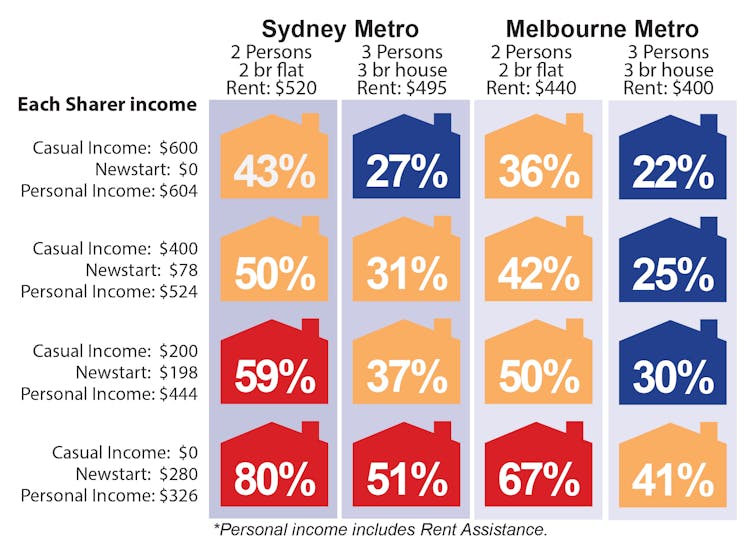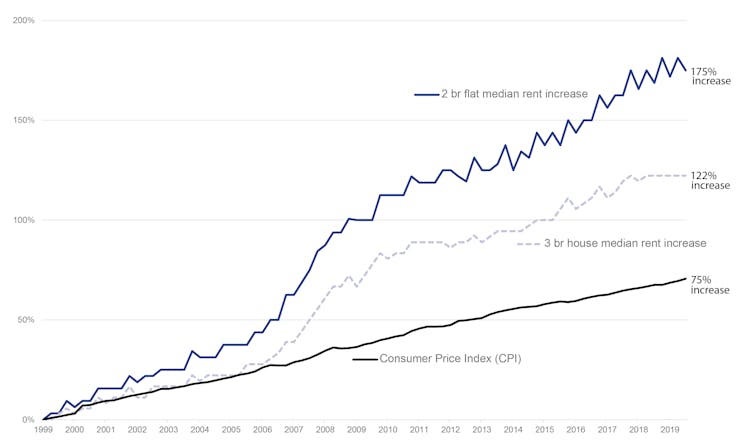Coronavirus puts casual workers at risk of homelessness unless they get more support
- Written by Simone Casey, Research Associate, Future Social Service Institute, RMIT University
Our analysis shows an economic downturn as a result of the COVID-19 pandemic will dramatically increase rental stress for people with insecure or casual work. If the downturn persists this will place people in precarious jobs at higher risk of homelessness.
The scenario we explored is the effect of loss of casual work on people on very low incomes. We identify this at-risk group as those aged between 19 and 30 years, living independently with disposable incomes of A$600 a week from casual work or a combination of casual work and benefits.
Read more: When it comes to sick leave, we're not much better prepared for coronavirus than the US
They typically work in cafes, restaurants, catering, events, fast food and retail. These are the jobs most immediately impacted by an economic slowdown. It is estimated one in four Australian workers is casual, although not all are on low incomes.
The infographic below illustrates the extreme rental stress a slowdown will cause the low-income casual workers. We have calculated average rent across the broader Melbourne and Sydney metropolitan areas. The infographic shows the impact on rental stress of losing up to A$300 per week of disposable income. The percentages represent the amount of income taken up by rent, with red indicating the most extreme rental stress.
 Source: REIA median rental data (December, 2019), A Guide to Australian Government Payments, authors' calculations
For example, the top row shows a casual worker in Sydney sharing a two-bedroom flat earning A$604 a week had A$344 disposable income after rent. The final row shows an individual in Sydney with A$326 weekly income after losing work income. Their rent then takes up 80% of their income, leaving them with A$66 a week to live on after rent.
The potential impact of the downturn on the disposable income of people with very low incomes means they will be in extreme rental stress unless they have savings.
So do they have savings?
The federal government has suggested casual workers have savings to tide them over. Our analysis of Australian Bureau of Statistics data suggests 38.9% of those earning A$600 or less per week have less than A$600 in savings to get them through. Over a quarter of this group are already in debt.
Another 26.6% of low-income casual workers have a month or less for things to get back to normal.
Source: REIA median rental data (December, 2019), A Guide to Australian Government Payments, authors' calculations
For example, the top row shows a casual worker in Sydney sharing a two-bedroom flat earning A$604 a week had A$344 disposable income after rent. The final row shows an individual in Sydney with A$326 weekly income after losing work income. Their rent then takes up 80% of their income, leaving them with A$66 a week to live on after rent.
The potential impact of the downturn on the disposable income of people with very low incomes means they will be in extreme rental stress unless they have savings.
So do they have savings?
The federal government has suggested casual workers have savings to tide them over. Our analysis of Australian Bureau of Statistics data suggests 38.9% of those earning A$600 or less per week have less than A$600 in savings to get them through. Over a quarter of this group are already in debt.
Another 26.6% of low-income casual workers have a month or less for things to get back to normal.
 Average savings of people earning A$600 a week.
Source: Income and Housing, Australia, 2017-18 (Australian Bureau of Statistics), Authors' calculations
These savings will be used up rapidly when average rent in a share house is A$133-220 per week in Melbourne and A$165-260 in Sydney. These rents include outer metropolitan areas, so rental stress in the inner cities will be worse, as our previous analysis.
Read more:
City share-house rents eat up most of Newstart, leaving less than $100 a week to live on
The downturn will affect a large number of people already on benefits because their income is partly from benefits and partly from earnings. According to data from the Department of Social Services, 41% of Youth Allowance recipients, 28% of NewStart recipients and 36% of Parenting Payment single recipients are working and therefore receive part-rate allowances.
Will the first economic stimulus package help?
For people already receiving benefits the one-off A$750 stimulus payment will help to tide them over for 3-4 weeks’ rent. But to date casual workers have not been included in that stimulus payment (unless they receive Family Tax Benefit).
People who lose their casual work will be able to get the new JobSeeker payment from March 20. It’s the same as the NewStart rate – A$326 per week (including average rent assistance) – so it is clear they will be in immediate rental stress.
Read more:
Morrison's coronavirus package is a good start, but he'll probably have to spend more
It’s worth noting this rental crisis is compounded because NewStart has not kept pace with rental increases over the last 25 years. NewStart has been increased by CPI only. The chart below shows how wide the gap between Melbourne rent price increases and CPI has become.
Average savings of people earning A$600 a week.
Source: Income and Housing, Australia, 2017-18 (Australian Bureau of Statistics), Authors' calculations
These savings will be used up rapidly when average rent in a share house is A$133-220 per week in Melbourne and A$165-260 in Sydney. These rents include outer metropolitan areas, so rental stress in the inner cities will be worse, as our previous analysis.
Read more:
City share-house rents eat up most of Newstart, leaving less than $100 a week to live on
The downturn will affect a large number of people already on benefits because their income is partly from benefits and partly from earnings. According to data from the Department of Social Services, 41% of Youth Allowance recipients, 28% of NewStart recipients and 36% of Parenting Payment single recipients are working and therefore receive part-rate allowances.
Will the first economic stimulus package help?
For people already receiving benefits the one-off A$750 stimulus payment will help to tide them over for 3-4 weeks’ rent. But to date casual workers have not been included in that stimulus payment (unless they receive Family Tax Benefit).
People who lose their casual work will be able to get the new JobSeeker payment from March 20. It’s the same as the NewStart rate – A$326 per week (including average rent assistance) – so it is clear they will be in immediate rental stress.
Read more:
Morrison's coronavirus package is a good start, but he'll probably have to spend more
It’s worth noting this rental crisis is compounded because NewStart has not kept pace with rental increases over the last 25 years. NewStart has been increased by CPI only. The chart below shows how wide the gap between Melbourne rent price increases and CPI has become.
 Median increase in Melbourne rents and CPI, June 1999 – December 2019.
Source: Rental Report, Department of Health & Human Services (Dec 2019), Consumer Price Index (ABS), Authors' calculations
So what needs to be done?
The loss of income for casual workers will result in extreme rental stress for people who were already on low incomes. This issue demands urgent attention to prevent a homelessness epidemic. Agencies like the Council for Homeless Persons are already calling for an immediate moratorium on evictions.
Landlords have a responsibility here as well since they benefit from continuity of rentals and the contribution of government policy to their wealth and assets. For example, low-income rents are paid out of a combination of regular earnings, benefit payments and rent assistance. These will now be supplemented because people on low incomes are likely to use the stimulus package to keep up.
The challenge for the government is to provide support to people on very low incomes that will see them through the entire COVID-19 crisis. One solution would be to immediately increase the JobSeeker payment to help people on low incomes ride out the downturn in casual work. Another solution would be to provide replacement income for casual workers affected by the downturn.
Median increase in Melbourne rents and CPI, June 1999 – December 2019.
Source: Rental Report, Department of Health & Human Services (Dec 2019), Consumer Price Index (ABS), Authors' calculations
So what needs to be done?
The loss of income for casual workers will result in extreme rental stress for people who were already on low incomes. This issue demands urgent attention to prevent a homelessness epidemic. Agencies like the Council for Homeless Persons are already calling for an immediate moratorium on evictions.
Landlords have a responsibility here as well since they benefit from continuity of rentals and the contribution of government policy to their wealth and assets. For example, low-income rents are paid out of a combination of regular earnings, benefit payments and rent assistance. These will now be supplemented because people on low incomes are likely to use the stimulus package to keep up.
The challenge for the government is to provide support to people on very low incomes that will see them through the entire COVID-19 crisis. One solution would be to immediately increase the JobSeeker payment to help people on low incomes ride out the downturn in casual work. Another solution would be to provide replacement income for casual workers affected by the downturn.
Authors: Simone Casey, Research Associate, Future Social Service Institute, RMIT University





